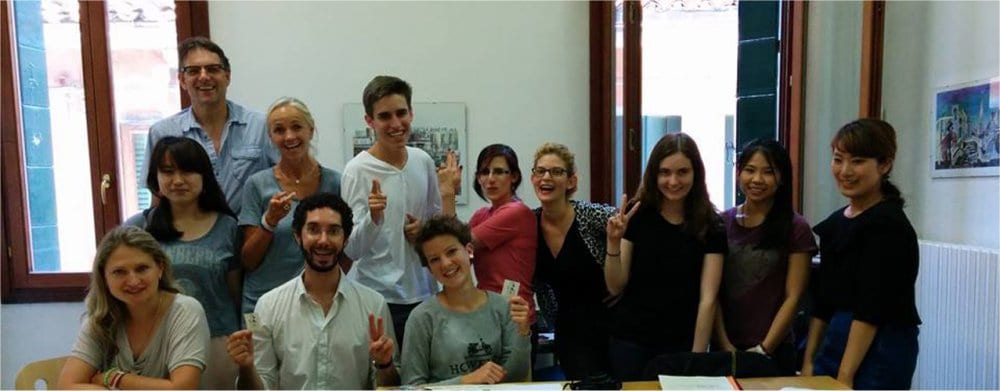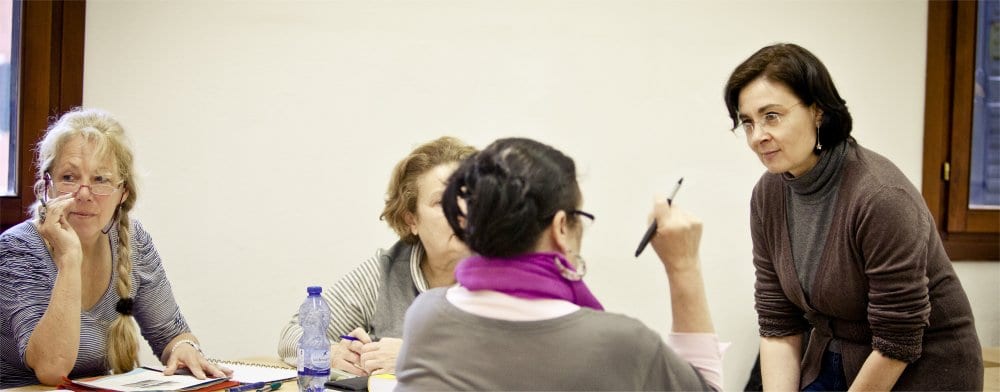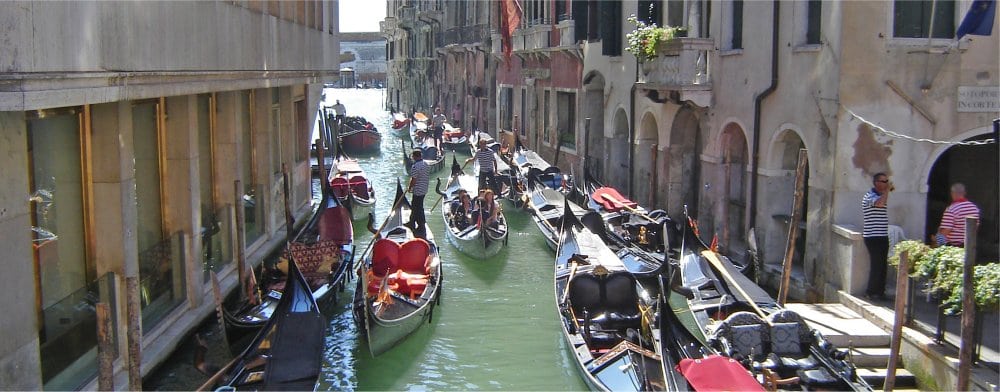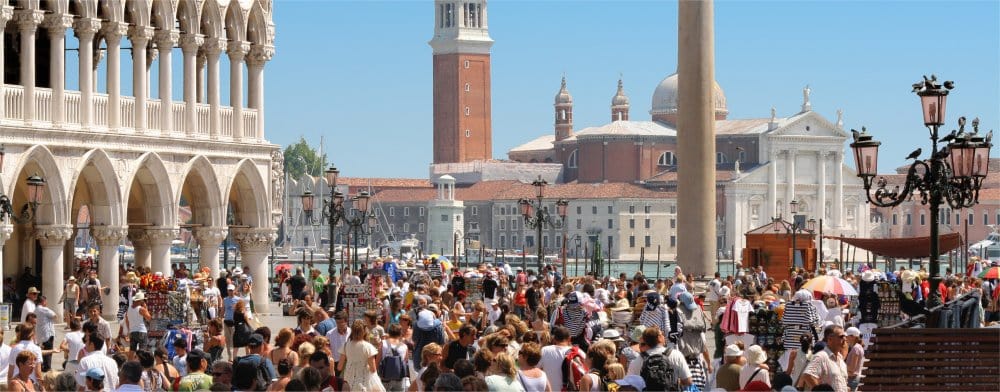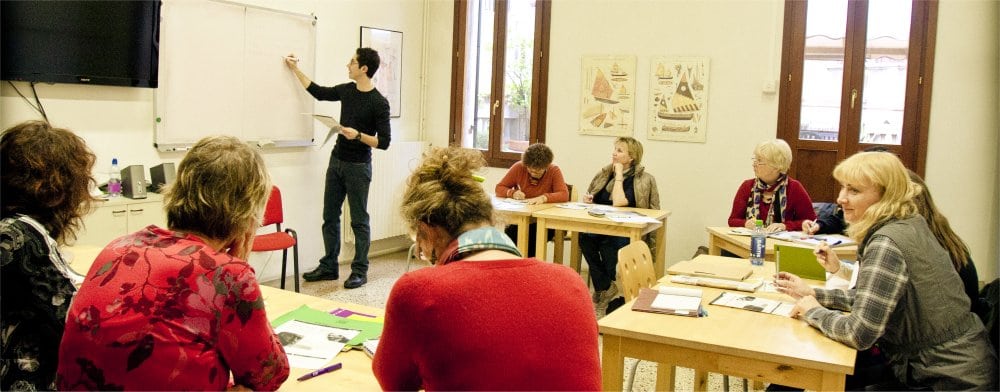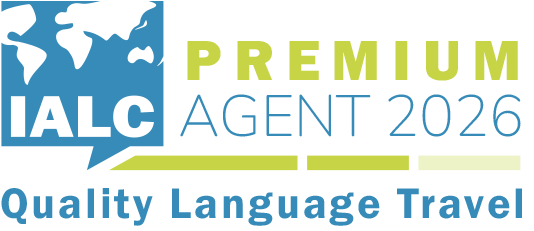Learn Italian in Venice: Teaching
The school’s aim it to get you talking Italian!
Talking Italian
Students are encouraged to speak Italian and only Italian for the very first day. Of course you will cover the four core skills of speaking, listening, reading and writing, with structured learning of grammar and vocabulary work included to develop all the essential Italian language skills.
Italian language levels / Rate of Progress
The curriculum is structured on 6 theoretical language levels, with a natural duration of four weeks at each level. This involves elements of traditional teaching methods and classroom activities such as language games, pair work and role-plays aimed at developing communicative fluency. The methodology is the result of years of experience in the intensive teaching of Italian. Every day according to the progress of the class and syllabus, a new area of language is introduced and practised.
Beginner/Elementary:
Covering basic grammatical structured knowledge to be able to communicate in the practical situations of daily life plus an introduction to Italian customs.
Intermediate levels:
Emphasises grammar with reference to the past tenses and development of conversation skills.
Advanced levels:
Deepening grammatical skills, providing fluency in conversation and a deeper knowledge of Italian culture, also written expression and the creation of texts.
In reality students chose to take an Italian group language course or Italian private tuition according to their linguistic goals, personal wishes and time constraints.
Level One: Beginners |
| Allow 4/6 weeks to progress to Level Two |
| This course addresses beginner students who have no knowledge of the Italian language. At the end of the course, students will be able to communicate in every day’s most frequent situations, using basic vocabulary and grammar. |
| Topic Division Grammar 25% Vocabolario 25% Oral comprehension and expression 30% Written comprehension and expression 20%Grammar Definitive and indefinite articles Simple present tense (regular verbs, three conjugations –are –ere –ire) Main irregular verbs: essere, avere, andare, fare, bere, rimanere, venire, uscire. Verbs Dovere (to have to, to must) Potere (to can, to be able to) Volere (to want). Use of “ci” (there) Simple past (perfect tense) Possessive adjectives and pronouns Use of the verb Piacere (to like) Reflexive pronouns Introduction to pronouns direct object Use of the simple prepositions and prepositions with article Imperative Conjunctions e (and) ma (but) mentre (while) quando (when) perchè (why, because)Communicative areas Identification: name, nationality…, Introducing oneself, Habits Asking and answering information Offering something, inviting someone, accepting, refusing Situations: in class, at the bar, the station, at the restaurant, in a store, a language school, in hotel. Talking about family, Describing people and items, telling a brief story in the past Asking for explanations about words or linguistic questions Expressing preferences; Expressing pleasure and displeasureOral comprehension Dialogues ; Messages (listening to a message at the answering machine, to the radio); Interviews (radio, TV); Video (movies, TV); Advertisements; Songs;Written comprehension Timetables; Menu; Memorandum; Post cards and letters to friends; Diary; Recipes; Short biographies; Short announcements; Advertisements; Comics; Short instructions; Catalogues; Field trip schedules or cultural programsOral expression and vocabulary Readings concerning: Studying and learning a foreign language Every-day-life situations Cities and means of transportation Space, forms, dimensions, quantity Time Written expression Fill in an enrolment form; writing a message; writing a post card; writing a diary page; writing a letter in familiar way. |
Level Three: Intermediate |
| Allow 8 weeks + |
| This course aims at strengthening comprehension, communication and writing skills, by using advance grammar. |
| Topic Division Grammar 20% Vocabolario 20% Oral comprehension and expression 30% Written comprehension and expression 30%Grammar Review of the main grammatical points of the previous levels Tenses agreement (indicative mood) Past perfect tense Introduction to the subjunctive mood Introduction to the conditional mood Comparatives and superlatives Informal/formal imperative with pronouns Use “si” with impersonal verbs Double object pronouns Relative pronouns Indefinite pronouns Communicative areas Telling facts, stories and experiences in the past; Describing places and people; Making comparisons and oppositions; Giving opinions; Expressing desires; Making suppositions Expressing feelings; Recommending and advising; Convincing someone to do something Asking for explanations concerning words or linguistic questions Oral comprehension Dialogues (original), songs, phone calls, movies, advertisement, radio and TV interviews Written comprehension Formal letters; Instructions; Stories; Reviews Oral expression Learning social life rules in conversations, phone calls, descriptions. Written expression Making attention to different text standards Writing reviews |
Level Five: Advanced |
| Allows 8 weeks + |
| It is ad advanced course that can be repeated by those who want to reach high fluency. The course investigates different aspects of the Italian language. |
| Topic Division Grammar 15% Vocabolario 20% Oral comprehension and expression 30% Written comprehension and expression 35%Grammar Tenses agreement, in particular with the subjunctive; complex sentences; analysing words; from direct to indirect speech; use of gerundio, infinitive and past participle. Oral comprehension The same materials of the previous level, with particular attention for regional pronunciation and accents, dialects. Oral expression Particular attention to the sentence-building, rules of syntax, correct pronounce, analysis of an Italian “standard” pronounce. Written comprehension The same activities of the previous level, plus readings of poems, announcement of public agencies. Written expression Trying different styles; creative writings. |
Course Structure
The Italian language school in Venice offers a schedule that works on a 4 week module basis.
So wherever possible we recommend you start on a designated beginner start date (whatever your level) so that you start the beginning of a module. You are of course welcome to join in weeks 2, 3 or 4 of a module, but for longer term students, week 1 is the best start date.
Teaching Method
Lessons are always held in Italian because this trains your brain to use the language more effectively, the Italian school in Venice also strongly believe that students need to learn both Italian language and at the same time learn about Italian culture, to give the language a meaningful context (and because this will increase your enjoyment of the language course).The Italian school believes this is the best method to ensure progress will be rapid and lasting. The teaching methodology is based on a fully communicative approach that promotes and encourages students’ active participation. It aims at developing oral and written communication skills. A wide variety of up-to-date authentic material is used in class, as valuable examples of real communication, thus introducing the students to Italian culture and society.
In order to increase and improve your Italian knowledge the Italian school will use :
- listening activities to improve your oral skills
- oral and written exercises
- reading activities to improve your comprehension of written texts
- activities in pairs or in groups
- grammar workshops
- vocabulary exercises
- educational games (still teaching, but in a more relaxed style)
- educational videos to improve your knowledge of Italy and its culture
During the course, the main communication skills – listening, speaking, reading and writing – are equally explored and gradually developed at all levels. Every week the teachers adjust and enrich the programme of your group in order to satisfy your interests and requirements.
Italian Teachers in Venice
The quality of teaching and of the educational materials is very important to the language school. This is why, staff at the Italian school have all attended special education seminars and teacher training programmes, especially the Itals Master Programme (Italian as second language) at Ca’ Foscari University and have experienced teaching Italian as a foreign language.
The teachers are always ready to help encourage the students and help you develop, enhance and improve your learning method. The teachers work as a team and arrange daily meetings in order to organize the different teaching departments; they regularly update their teaching material and discuss and compare different techniques.
Italian Students in Venice
Every month, the Italian courses are attended by people from all over the world. The class composition is varied and there are never students of just one nationality. Students come to Venice from across the world, but predominantly from Western Europe, America and Asia. This encourages the use of Italian language not only during the lessons but also in a range of contexts, in the daily Venetian life and during the afternoon activities. The average age of the students ranges from 25 to 35 yrs, but there are students of every age in the classrooms (from 18 yrs +).

